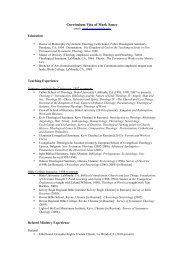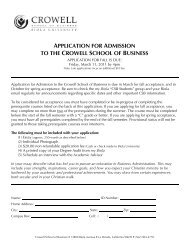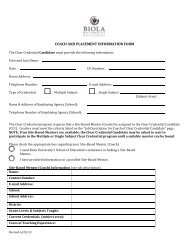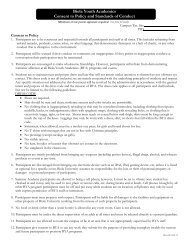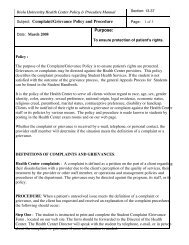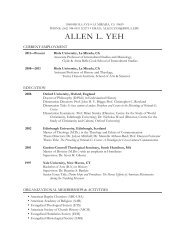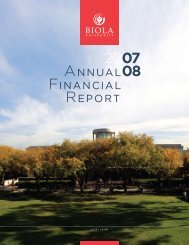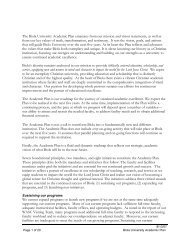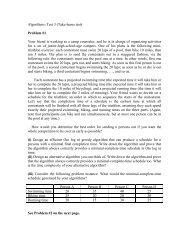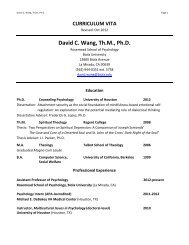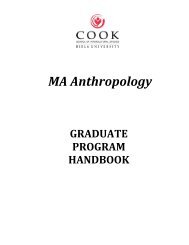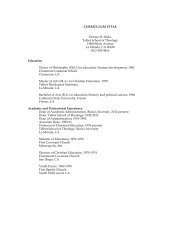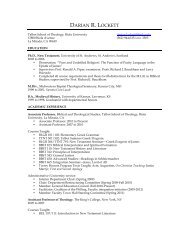You also want an ePaper? Increase the reach of your titles
YUMPU automatically turns print PDFs into web optimized ePapers that Google loves.
<strong>Biola</strong> librarian. Detailed information is found in the Student<br />
Dissertation Guidelines.<br />
9. Final Oral Examination<br />
The final examination is an oral defense of the dissertation before<br />
the doctoral committee and other invited professionals.<br />
P s y. d. I n C l I n I C a l P s yC h o l o G y<br />
1. Residence and Course Work<br />
Normally, four years of residency are required unless transfer<br />
of credit is brought in and advanced standing granted. While<br />
the doctorate is not awarded simply for completion of stated<br />
course work, there are basic unit requirements for the degree<br />
(133 semester hours). Each student is assigned a faculty advisor<br />
who assists in the planning of each semester’s schedule of<br />
courses and supervises the student’s progress in the program.<br />
For transfer credit, see General Academic Information.<br />
Psychology: Psy.D. students must complete a minimum of 76<br />
semester hours of psychology. These 76 units must include 46<br />
required psychology units, 18 units of practicum and 12 units<br />
of elective psychology courses. Students may apply up to 6<br />
units of graduate coursework from the School of Intercultural<br />
Studies toward the total psychology hours requirement.<br />
Psychotherapy Laboratory: Students in the Psy.D. program<br />
must complete 21 units selected from psychotherapy lab<br />
courses. These are taken in the second, third and fourth years.<br />
Theology: All students must complete a minor in theology<br />
which includes a minimum of 17 semester units.<br />
Integration Seminars: All students participate in a series of<br />
seminars (14 units) devoted to the integration of a variety of<br />
theological and psychological concepts in research, theory<br />
and practice.<br />
Dissertation Research: Students in Rosemead’s Psy.D.<br />
program may fulfill the research component of their program<br />
either by writing a dissertation or by successfully completing<br />
a research consumership sequence (5 units) which includes<br />
a year-long doctoral research seminar, a doctoral paper<br />
consisting of a critical review of research literature on a clinical<br />
topic, and a proficiency examination for consumers of clinical<br />
research.<br />
2. Progress Evaluations<br />
Each year students are evaluated on their general progress<br />
toward completion of degree requirements. These evaluations<br />
include review of each student’s academic skills, clinical<br />
skills, and personal / interpersonal / spiritual growth as required<br />
by the program. Because all of these areas are integral<br />
to the practice of clinical psychology and the distinctive of<br />
Rosemead’s program, deficiencies in any of them may result<br />
in program termination. However, the general objective of<br />
such evaluation is to provide feedback conducive to continued<br />
growth and development toward successful completion<br />
of the degree, high quality of service to clients, and high level<br />
of professional competence. Procedures and processes for the<br />
evaluations are specified in the Rosemead Student Handbook.<br />
3. Comprehensive Examinations<br />
All students must pass a set of doctoral-level comprehensive<br />
examinations covering the following areas: (1) psychological<br />
intervention; and (2) psychology & theology.<br />
These examinations are given twice annually and serve as the<br />
major means of evaluating a student’s suitability to continue<br />
studies toward the doctorate. The examinations may be taken<br />
after completion of 75% (100 units) of the course work and<br />
must be successfully completed prior to the Professional<br />
Qualifying Examination.<br />
Only one retake of the examination is allowed. The dates of<br />
the Comprehensive Examinations are specified in the Academic<br />
Calendar.<br />
4. Admission to Candidacy<br />
Official candidacy for the doctorate signifies an advanced<br />
stage in the student’s progress. In order to be admitted to<br />
candidacy the student must have:<br />
• Successfully completed the Preliminary Oral Interview<br />
• Passed the Comprehensive Examinations<br />
• Received approval of the dissertation proposal by the<br />
Doctoral Committee or completed the two-semester,<br />
five-credit Doctoral Research Seminar and comprehensive<br />
proficiency research examination<br />
• Completed training therapy<br />
5. Professional Qualifying Examination<br />
All doctoral students must successfully complete an examination<br />
that evaluates the student’s readiness for a full-time<br />
internship. It may be taken any time after the comprehensive<br />
examinations have been passed and must be completed prior<br />
to acceptance of an internship. The examining committee<br />
may require the student to complete additional course work,<br />
practicum, or other professional growth experiences prior to<br />
beginning the internship. See the Professional Qualifying Examination<br />
Guidelines in student handbook for further detail.<br />
6. Internship<br />
All students are required to successfully complete a one-year,<br />
full-time clinical internship prior to graduation. All internships<br />
are to be approved in advance by the Clinical Training Com-<br />
20<strong>05</strong> – 20<strong>07</strong> C ATA LO G Rosemead School of Psychology 269



